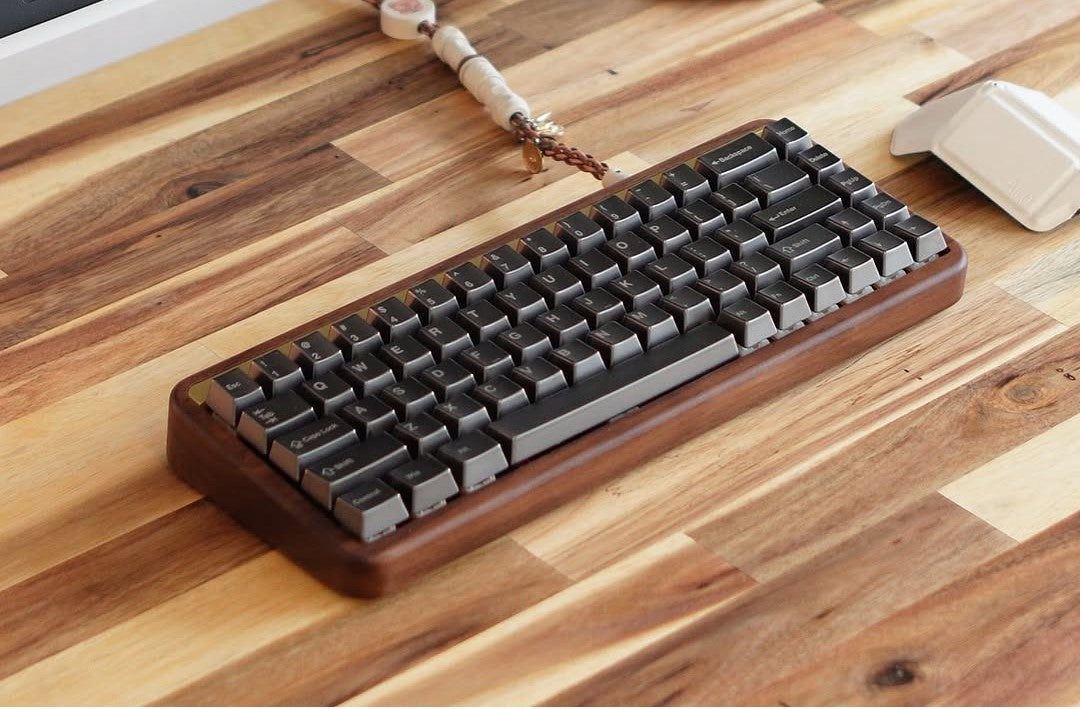업무에 적합한 무소음 키보드를 선택하는 방법
생산적인 업무 환경을 조성할 때 편안함과 집중력은 필수입니다. 집중력에 영향을 미치는 가장 중요한 도구 중 하나는 바로 키보드입니다. 공용 공간에서 작업하거나 조용한 업무 공간을 선호한다면 무소음 키보드를 선택하는 것이 큰 도움이 될 수 있습니다. 이 블로그 게시물에서는 자신의 업무 환경에 맞는 최고의 무소음 키보드를 선택하는 방법을 알아보겠습니다.
직장에서 무소음 키보드를 고려해야 하는 이유는 무엇일까요?
기존 기계식 키보드에서 발생하는 소음은 특히 다른 사람들이 근처에 있는 공동 사무실이나 집에서는 방해가 될 수 있습니다. 무소음 키보드는 다음과 같은 여러 가지 이점을 제공합니다.
- 소음 방해 감소 : 무소음 키보드는 더 조용하므로 사용자와 동료에게 소음 공해가 줄어듭니다.
- 집중력 향상 : 타이핑 소음이 줄어들어 방해 없이 작업에 더 집중할 수 있습니다.
- 전문적인 환경 : 조용한 키보드는 가상 회의나 사무실 토론 중에 보다 전문적인 느낌을 줍니다.
이제 무소음 키보드의 중요성에 대해 알아보았으니, 업무에 가장 적합한 키보드를 선택하는 방법을 알아보겠습니다.
무소음 키보드를 선택할 때 고려해야 할 핵심 요소
위 사진은 Awekeys Lunar Maria 키캡 입니다.
1. 스위치 유형
스위치 유형은 키보드 소음 수준에 중요한 영향을 미칩니다. 고려해야 할 주요 스위치 유형은 두 가지입니다.
-
멤브레인 스위치 : 멤브레인 키보드는 기계식 키보드보다 소음이 적어 조용한 타이핑을 원하는 사용자에게 적합합니다. 멤브레인 키보드는 소음이 적은 러버 돔 메커니즘을 사용하여 작업 환경에 매우 적합합니다.
-
저소음 옵션을 갖춘 기계식 스위치 : 기계식 키보드의 느낌을 좋아하지만 소음을 줄이고 싶다면 "저소음" 기계식 스위치를 찾아보세요. 예를 들어 Cherry MX Silent Red 또는 Silent Black 스위치는 기계식 스위치 제품군 중 더 조용한 옵션입니다. 기존 스위치보다 훨씬 조용하면서도 촉각적 피드백과 내구성을 제공합니다.
2. 제작 품질 및 내구성
키보드의 제작 품질은 타이핑 경험과 소음 수준에 영향을 미칩니다. 제작 품질이 좋은 키보드는 덜거덕거리는 소리가 적어 타이핑 소리가 더 조용합니다. 고품질 플라스틱이나 금속 프레임으로 제작된 키보드를 찾아보세요. 이러한 키보드는 일반적으로 더 견고하고 소리가 더 좋고 조용합니다.
3. 타이핑 느낌
타이핑 경험은 주관적일 수 있지만, 타이핑하기 편안한 키보드를 선택하는 것이 중요합니다. 장시간 작업하는 경우, 불편한 키보드는 피로와 부담을 유발할 수 있습니다. 타이핑 느낌을 평가할 때 다음 사항을 고려하세요.
- 키 이동 거리 : 키가 눌렸다는 것을 인식하기 전까지 이동하는 거리는 타이핑 소리와 느낌에 영향을 미칩니다. 이동 거리가 짧을수록 타이핑 소리가 더 조용해질 수 있습니다.
- 촉각형 vs. 선형 vs. 클릭형 : 무소음 키보드는 일반적으로 클릭형 스위치가 아닌 선형 또는 촉각형 스위치를 사용합니다. 클릭형 스위치는 일반적으로 소리가 크므로 소음이 걱정된다면 피하는 것이 좋습니다.
4. 인간 공학
인체공학적 키보드는 자세를 개선하고 손목과 손의 부담을 줄여주도록 설계되었습니다. 장시간 작업하는 경우, 인체공학적 키보드는 편안함에 큰 차이를 만들어 줄 수 있습니다. 가장 편안한 타이핑 자세를 찾을 수 있도록 각도 조절이나 분할 레이아웃이 있는 키보드를 찾아보세요.
5. 크기 및 레이아웃
키보드 크기는 편의성과 편안함 모두에 중요한 역할을 합니다. 키보드는 여러 가지 레이아웃으로 제공됩니다.
- 풀사이즈 키보드 : 숫자 패드를 포함한 모든 키가 풀사이즈로 구성되어 있습니다. 숫자 입력이 많거나 모든 키를 손쉽게 사용할 수 있는 환경을 선호하는 사용자에게 적합합니다.
- 텐키리스(TKL) : 이 키보드에는 숫자 패드가 없어 책상 공간이 더 넓고 디자인이 더 컴팩트합니다.
- 컴팩트 키보드 : 가장 작은 공간을 원한다면 키가 적은 컴팩트 키보드가 적합할 수 있습니다. 컴팩트 키보드는 가볍고 휴대성이 뛰어나지만, 풀사이즈 키보드에 익숙하다면 익숙해지는 데 시간이 걸릴 수 있습니다.
6. 연결 옵션
유선 키보드와 무선 키보드 중 어떤 것을 선택할지는 사용자의 선호도와 작업 공간 설정에 따라 달라집니다.
- 유선 키보드 : 배터리 수명 걱정 없이 안정적인 연결을 제공합니다. 하지만 움직임 측면에서는 유연성이 떨어질 수 있습니다.
- 무선 키보드 : 깔끔한 책상을 선호하거나 자주 움직여야 한다면 무선 키보드가 더 나은 선택일 수 있습니다. 안정적이고 지연 시간이 짧은 환경을 위해 Bluetooth 또는 2.4GHz 무선 연결을 선택하세요.
7. 가격
가격은 기능과 브랜드에 따라 크게 다릅니다. 무소음 키보드는 저렴한 모델부터 RGB 조명, 프로그래밍 가능 키, 고급 스위치와 같은 추가 기능이 있는 고급 모델까지 다양합니다. 저렴한 제품을 선택하고 싶을 수도 있지만, 고품질 무소음 키보드에 투자하면 장기적으로 업무 경험을 향상시킬 수 있습니다.
업무용 최고의 무소음 키보드
더 조용하고 생산적인 작업 공간에 적합한, 높은 평가를 받은 무소음 키보드 몇 가지를 소개합니다.
-
로지텍 K780 멀티 디바이스 무선 키보드 : 여러 기기에 연결할 수 있는 편안하고 조용한 멤브레인 키보드입니다. 노트북, 태블릿, 스마트폰을 번갈아 사용하는 분들에게 적합합니다.
-
Microsoft Sculpt Ergonomic Keyboard : 이 인체공학적 키보드는 조용하고, 손을 더 편안하게 놓을 수 있는 분할 레이아웃을 제공하며, 장시간 타이핑에 적합합니다.
-
Keychron K3(핫스왑 가능) : 기계식 스위치 팬의 경우, Gateron 로우 프로파일 기계식 스위치가 장착된 Keychron K3는 많은 사용자가 선호하는 촉각적 피드백을 제공하면서도 더 조용한 환경을 제공합니다.
-
로지텍 MX Keys : 슬림한 디자인의 프리미엄 저소음 멤브레인 키보드로 사무 작업에 안성맞춤입니다. 뛰어난 키감과 안정성을 자랑하여 장시간 타이핑에도 적합합니다.
결론
 위 사진은 Awekeys Thor Copper 키캡 입니다.
위 사진은 Awekeys Thor Copper 키캡 입니다.
업무용 무소음 키보드를 선택하는 것은 소음을 줄이는 것뿐만 아니라 전반적인 타이핑 편의성과 생산성을 향상시키는 것도 중요합니다. 멤브레인 스위치의 부드러움을 선호하든, 기계식 스위치의 내구성을 선호하든, 다양한 옵션이 있습니다. 스위치 유형, 타이핑 느낌, 인체공학, 연결성 등의 요소를 고려하여 작업 공간을 개선하는 완벽한 무소음 키보드를 찾을 수 있습니다.
소음 때문에 업무에 집중하지 마세요. 나에게 맞는 무소음 키보드를 선택하고 오늘부터 조용히 타이핑하세요!




